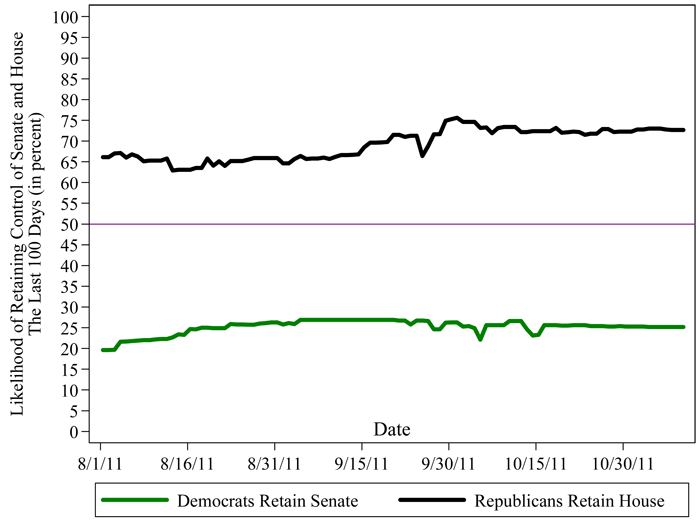Handicapping the election-year math in Congress
The 2012 election cycle will likely bring many changes—among them a potential shift in Washington's balance of power.
Right now, the Republican party holds a solid majority in the House of Representatives, and party officials are optimistic that the GOP can recapture the White House. The prediction markets—where traders in data handicap likely outcomes in the political world—have assessed the race for the White House essentially as a tossup, giving Barack Obama about a 50 percent likelihood of keeping his job.
Meanwhile, the U.S. Senate, where Democrats hold a slim majority, seems likely to tilt into GOP control. The prediction markets forecast a 25 percent likelihood that Democrats can keep their Senate majority.
Indeed, the numbers don't seem likely to break for Senate Democrats in 2012. Of the chamber's 100 seats, 53 caucus with the Democrats—including Independent Sens. Joseph Lieberman of Connecticut and Bernie Sanders of Vermont. Thirty-three Senate seats will be in play for the 2012 cycle, with Republicans needing to pick up four seats to gain a majority.
One obvious reason that the GOP looks well positioned to win the Senate is the sour state of the economy. With unemployment around 9 percent, Democratic senators will have a tough time defending the Obama economic record, since voters tend--rightly or wrongly—to assign economic blame or credit to the party controlling the presidency.
Beyond the salience of big issues, though, campaign math isn't favoring the Democrats. Simply put, Democrats have many more vulnerable seats up for grabs next November than Republicans do. Democrats control 23 of the 33 seats up for election next year—and at least six senators who caucus with the Democrats are going to retire, while two more Democratic incumbents have yet to confirm whether they will run for re-election. The number of Republican senators who are not up for re-election this cycle, meanwhile, is just two.
The GOP majority in the House also enjoys a strong mathematical advantage coming into 2012. Of the 435 seats in the House, 242 caucus with the Republicans; 192 Representatives caucus with the Democrats. (One seat—which had belonged to a Democrat—is presently vacant.) With all 435 House seats in play this cycle, the GOP would have to forfeit control of 26 seats to the Democrats in order to lose its House majority. Right now, the InTrade prediction market places the likelihood of that outcome at 25 percent—exactly the same odds, in other words, that it has assessed for Democrats to retain control of the Senate.
What's more, the 2010 Census looms over the 2012 elections—in a way that again favors the Republicans. In the first election after every census the government reapportions the seats between the states to reflect population shifts. In general, seats were lost in the Northeast and Midwest, where Democrats have traditionally performed well; and the Southeast and Southwest—traditional strongholds for the GOP--gained seats. Republicans control most of the state legislatures in the 10 states picking up additional House seats-- including 4 seats in the heavily Republican state of Texas--the new congressional districts will likely be drawn up with boundaries favoring the Republicans. That is the simplest kind of political math.
As the election progress we at the Signal will get into more depth about which individual races will be pivotal and how they all interact. I can predict with certainty that these numbers will move during the course of the next 12 months; the only question is how. And the way to chart these shifts is to keep following election and campaign coverage on The Signal.
David Rothschild is an economist at Yahoo! Research. He has a Ph.D. in applied economics from the Wharton School of Business at the University of Pennsylvania. His dissertation is in creating aggregated forecasts from individual-level information. Follow him on Twitter @DavMicRot and email him at thesignal@yahoo-inc.com.




